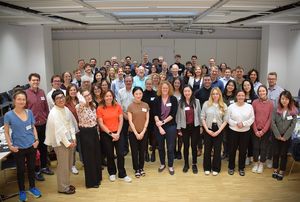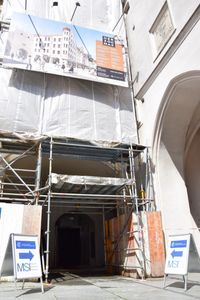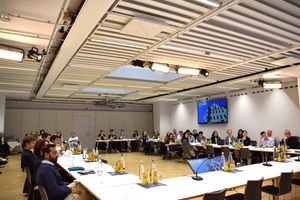The MSI 2025 took place from 26 to 28 May 2025 with around 85 participants in the Institute’s new premises – a successful and also instructive baptism of fire in terms of technical and procedural aspects. This year’s event offered an inspiring synthesis of academic exchange and networking in the research fields of digitalization, artificial intelligence, innovation, intellectual property, organizational design and digital governance.
The main conference was preceded by the fourth MSI Ph.D. Workshop on 21 May 2025 at Ludwig-Maximilians-Universität (LMU) Munich. This one-day event brought together early career researchers from across Europe and beyond. The program included five sessions that focused on digitalization, platform competition, entrepreneurship and eco-innovation, and innovation and learning. Projects ranged from empirical studies on copyright enforcement and algorithmic influence to research on carbon markets and intergenerational knowledge transfer.
The program of this year's main conference included two keynote speeches, 16 presentations to the plenary and two poster sessions, again preceded by very engaging poster slams. The program of the first day started with a guided city tour from the LMU through the historic old town of Munich to the new Institute building. The scientific part was dedicated to three lectures on the topic of organization. The day ended with the official reception.
The presentations on the second day of the conference dealt with topics from the areas of platforms and consumer computing technologies, AI and innovation as well as collaborative research and development. In her keynote entitled “Innovation in Digital Platforms: How Can Regulation and Antitrust Help?”, Fiona Scott Morton, Theodore Nierenberg Professor of Economics at Yale University School of Management and Adjunct Professor at Yale Law School, presented her latest research on antitrust policy and platform regulation.
In keeping with good MSI tradition, the second day ended with a hearty dinner in a typical Bavarian tavern. Here, Khwan Kim (INSEAD) received this year’s Best Paper Award for his paper“Kindle’s Shadow: How Digitization Dims Novelty in Creative Industries”, co-authored with Manav Raj, which provides new insights into the unintended consequences of digital transformation..
The last day of the conference featured presentations on the topics of patents, data protection and security. Michela Giorcelli, Associate Professor at the University of California, Los Angeles, provided a historical perspective on the diffusion of innovations in post-war economies in her keynote speech on“The Diffusion of Soft Technologies During and After World War II”, presenting compelling reflections on long-term growth and technological change.
All those involved in the organization would like to thank the speakers, discussants and the participants for an exciting Munich Summer Institute 2025. We are already looking forward to the Munich Summer Institute 2026, then the tenth MSI!
More information: http://munich-summer-institute.org



